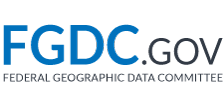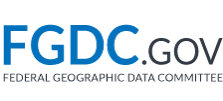Persons Attending:
Bruce Ambacher (Historical WG), Gerry Barton (NOAA), Marilyn Buford (Vegetation SC), Don Buhler (Cadastral SC), Kim Burns-Braidlow (FGDC Staff), Dave Catlin (EPA), Kathy Covert (FGDC Staff), George Cross (Earth Cover WG), Jeff de La Beaujardiere (NASA), Greg Elmes (UCGIS), Max Ethridge (Base Carto SC), Andrew Euston (HUD), Alan Gaines (NSF), Eric Goods (FGDC Staff), Norm Gunderson (FGDC Staff), Anne Hale Miglarese (Bathymetric SC -via phone), Gilbert Mitchell (NOAA), John Moeller (Chair), David Morehouse (DOE), Katie Ryan (LOC), Peter Schweitzer (Geologic SC), Michael Shean (NACo), Bruce Spear (Ground Transportation SC), Tom Usselman (MSC), Leslie Wollack (NASA)
Information Items
John Moeller reported that no one has stepped forward to help with Rick Pearsall's request for a meeting coordinator for the 11th ISO TC211 Plenary to be held on September 2000 in Reston, Virginia. Mr. Moeller stated that Mark Reichardt is now working on NSDI international activities for the FGDC Secretariat and he will take the lead on this matter, however, participation is encouraged from FGDC member agencies to ensure there is NSDI/FGDC input.
Rick Pearsall and Barbara Poore are having a meeting in Herndon, Virginia, June 3-5, on Train the Trainer on Metadata.
Julie Binder Maitra is the new FGDC Standards Coordinator. Mark Reichardt is the NSDI International Coordinator.
Greg Elmes reported that he recently tried to gather contact information on federal agency's budget authority staff with regard to GIS budget control and found that a comprehensive list does not exit. Dr. Elmes needed this list for the Geodata Forum. Other members agreed that this list could be useful for many other instances.
- Action- Dr. Elmes will provide the Secretariat the list he has compiled and Coordination Group members will add additional names.
Gerry Barton reported that Greg Withee has been appointed to head NSDIS. The Department of Commerce 1998 report is available on the ESDIM web site at www.esdim.noaa.gov. Mr. Barton distributed CEOS brochures and briefly discussed a recent WGISS meeting.
Geodata Forum Update
Kathy Covert discussed some of the logistics for the Forum, including that 350-375 people have registered. Demographics for the registrants include: 5 countries and 35 states; 45% are fed's, 16% academics, 16% private sector, 10% regional, city, county officials, and 8% state government. John Moeller discussed the Forum's agenda.
C/FIP and You
Norm Gunderson expressed the same concerns as Dr. Elmes with regards to identifying early in the C/FIP development process the key budget people within the federal agencies he needed to collaborate with. Writing the C/FIP paper has problems yet to be solved and Mr. Gunderson would like to see everything completed by the Forum. Mr. Gunderson said that people view C/FIP as in competition with other initiatives. A statement in DOT markup language said that they may participate later in the year. On a positive note, Mr. Gunderson reported that 9 Congressional members have signed letters supporting C/FIP. Mr. Gunderson said to be prepared for a roller coaster ride with the budget this year and to keep pushing C/FIP as a good budget initiative. Partners can play a big role in this now since federal agencies are prohibited from lobbying Congress. Dr. Elmes said he is willing to act as a voice for the group. Mr. Gunderson added that NACo and NSGIC have resolutions to C/FIP, these are on the FGDC web site.
FY01 issues are less certain. Mr. Gunderson said there should be Steering Committee agency commitments and expressed possibilities of agency coalitions. Mr. Gunderson asked members to notify him if they have any information regarding their agencies FY01 activities that can fall under C/FIP.
Alan Gaines referenced an annual memo to agency heads that discusses FY01 interagency research and development priorities. The memo serves three primary purposes. First, it reiterates the investment principles that apply to all Federal R&D programs, especially those programs in the 21st Century Research Fund. Second, it identifies a set of activities that require a significant level of interagency coordination and focus for the FY 2001 budget cycle. Finally, it describes the R&D performance measures and accountability standards departments and agencies will be expected to observe.
Mr. Gunderson concluded by stating we are taking a new step forward and it is an evolutionary process that came out of the NAPA study. He said it is supported by stakeholders as a good government activity.
Mapping Science Overview
Tom Usselman briefed on the structure of National Academy of Science, of which the Mapping Science Committee is a part. The history, Dr. Usselman said, began when the Mapping Science Committee was requested by the USGS to look at mapping activities which led to their 1993 report. They have since done many follow-up activities on partnerships and the future of spatial data. Last year they did a report on distributed geolibraries which will be released on Monday at the Geodata Forum. Dr. Usselman discussed the Digital Geolibrary workshop to be held at Geodata Forum. The workshop goals are to develop a vision of geolibraries and identify research and policy issues. The Mapping Science Committee is now developing an assessment of geographic information sciences - what are education needs, research opportunities, workforce needs, etc. They are also looking at doing something useful to help promote C/FIP. Dr. Usselman suggested that they could also do a quick assessment of CAP programs.
NAPA GDIN Review
Alan Gaines reported on the NAPA GDIN Policy Study that was recently commissioned. The study is an analysis of certain legal limitations on access to and disclosure of disaster management data within the US that will be important to consider in developing a national component of the GDIN, that being the National Disaster Information Network. The study, which is available on the web at www.napawash.org/napa/index.html, looked at legal limitations involving intellectual property, privacy, liability, and security concerns. Dr. Gaines stated that GDIN was supposed to include classified data but there are classes of other data that fall under critical issue data that require security measures - such as location of power grids and they felt there needed to be some information about security issues of sensitive non-classified data. The study recommends the use of metadata and a metadata clearinghouse, along with mentioning the FGDC and the NSDI.
Dr. Gaines discussed various proposed Bills concerning topics such as anti-piracy and consumer/investor access promoting e-commerce and their use of 'reasonable use' clauses in an effort to avoid legal pit falls. With respect to the Privacy issue, Dr. Gaines said the FGDC is in good shape because of its well thought out Privacy Policy. Regarding liability issues, Dr. Gaines stated that if you provide standards or any kind of indication of quality or integrity then you may be liable for misuse. A question was raised as to if you document data and someone misuses the data, are you liable. Dr. Gaines says he suspects this will have to be tested in the courts. Data quality is subjective. Dr. Gaines encouraged everyone should take a look at the report and bring this issue to the table at a future meeting. It was suggested that at that future, there be knowledgeable legal council.
- Recommendation: Discuss legal liability issues at future meeting.
Digital Earth Video
A brief, still in draft form, Digital Earth video was played for the group. A suggestion was made to mention the Digital Earth and the FGDC web sites at the end of the video.
Communities and GIS
Andrew Euston, HUD, said he is concerned that recent activities, such as the Geodata Forum and C/FIP are leaving out the basis issue of civic access, as opposed to access by professional and planning groups. There needs to be outreach that is very hands-on. Mr. Euston is concerned that funds and technology are not matched at the community level. He asked who will it reach and how far will it dip down to the local and regional level. Community 20/20 reaches certain people, it has a proprietary format, but people don't use it - it is hard to sell. How can they make sure it reaches people at the local level? How can we mobilize to that level? He invites anyone interested in these issues to talk to HUD.
Planning for future Coordination Group meetings
Mr. Moeller suggested the group move to 'central themes' for a few upcoming meetings. The first being a convergence of technologies and projects. At the July meeting, the Digital Earth Reference Model and web mapping test bed project will be discussed. Other 'themes' may come out of the Forum. As discussed in today's meeting, Technology/ Policy/ Liability issues will need to be discussed at an upcoming meeting, possibly in September. Dr. Elmes would like to report the outcome of the UCGIS summer assembly in July.
Mr. Moeller reminded those leading the new ad-hoc task groups resulting from the Shepherdstown retreat to continue to make progress on the issues that were deemed important to the group.
Subcommittee and Working Group Chairs were asked to follow up on those FGDC endorsed standards they have sponsored in an effort to identify users of their standards. This is a result of comments received that most of the endorsed FGDC standards are one-agency standards. Chairs are to ensure that this information finds its way to their web sites.
- Action: Chairs ensure Subcommittees and Working Groups who have endorsed FGDC standards include information about the multi-user community of their standard(s) on their web site.
Next Meeting:
Tuesday, July 6, 1999
9:00 to 3:30
National Science Foundation
4201 Wilson Boulevard, Room 340
Arlington, Virginia
The National Science Foundation is located in the Ballston area of North Arlington, Virginia, between Wilson Boulevard and Fairfax Drive, one block south of the Ballston-Marymount University Metro stop on the Orange Line.
Instructions on getting to NSF can be found at:

